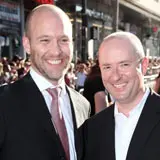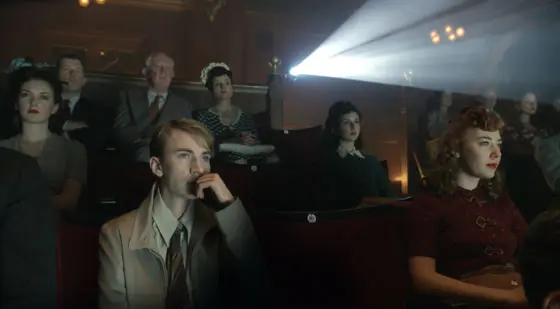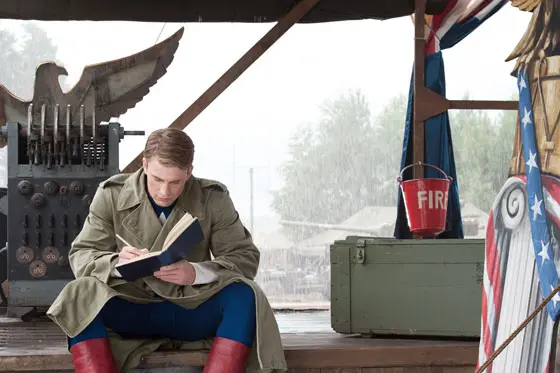 When the 2011 summer movie schedule started to take shape, it initially looked like Captain America: The First Avenger might get lost in the shuffle.
When the 2011 summer movie schedule started to take shape, it initially looked like Captain America: The First Avenger might get lost in the shuffle.
After all, it was slated to be the last of four superhero adaptations to hit screens. However, over $300 million worldwide and a great reception from critics and audiences alike, it’s clear that the Sentinel of Liberty was more than able to stand out in the crowd.
As noted in our Captain America: The First Avenger Blu-ray review, a big part of the movie’s success is owed to the work of its writers, Christopher Markus and Stephen McFeely.
With Captain America: The First Avenger slated to hit shelves on Blu-ray and DVD on Tuesday, Markus and McFeely set aside a few minutes to talk with TheHDRoom about crafting a screenplay that shows true heroism to a cynical world, making it all fit with a much larger story, and what’s in store for the Star-Spangled Avenger in the future.
Steve, thanks so much for joining us.
Stephen McFeely – Hey, thanks for doing this. And thanks for that review.
You read the review?
SM – Yeah, I’ve been showing it off to people! I’ve been telling people, “Look at all the nice things this guy said about us!”
Well, thanks for that. Do we know when Christopher will be joining us?
SM – Hang on, let me give him a call. He’s getting married this weekend, so…
Damn. That’s a lot to have on your plate – tons of press and a wedding to take care of.
SM – I know. It’s kinda bittersweet. He’s about to be lawfully wedded and I’m not going to be the top person in his life. It’s like he’s getting married to one person and getting divorced from me! (laughs)
Christopher Markus – Hello? Everybody here?
Chris, welcome to the party! I hear you’ve got a lot going on this weekend.
CM – Yeah, it’s been… hectic. (laughs)

Obviously next year’s The Avengers has been in the works for years now, and all the other pieces to the puzzle (Iron Man, Hulk, Thor) were going to be released ahead of Cap. While writing Captain America, were there parameters regarding what you could and couldn’t do with Cap so as not to disturb the grand scheme of things, or were you guys kind of given a blank slate?
SM – Well, The Avengers sort of determined the movie we could tell. We knew that we had to get Cap to the modern day by the end. You know, we realized we have to make this guy more-or-less die and then wake up 70 years later; we knew he’d have to sacrifice himself at the end, so we sort of created a narrative that’s perfect for Cap and freed us up to do a story about who this guy is.
CM – We were also freed up quite a bit, because we’re set 70 years before the other movies, so it wasn’t like, “We can’t put Cap here, because this is happening over there.” And those things are concerns when you’re dealing with Iron Man or the Hulk, because those movies are all kind of operating within six months of each other, so it was all pretty wide open from that standpoint.
Talk a little bit about what your thought process was in crafting Steve Rogers, because on the surface, he’s a pretty archetypal hero, and yet this story infused him with some great humanity.
SM – That was something we really tried to do. It took us awhile to sort of be okay with the idea of making Cap very genuine and earnest. There’s a tendency in modern superhero movies that they all have to have these dark centers.
CM – (laughs) “Can Captain America CONTROL HIS RAGE?!”
SM – We actually thought about dirtying him up a little bit at one point, but in the end that’s not Cap. Gary Cooper didn’t have a lot of angst, so it’s okay to make the guy a hero before he actually becomes the hero.
CM – It also allowed us to make the other characters not necessarily darker but a little quirkier. We were able to make Bucky a little more altered by his experiences to make Cap stand out as a good guy. You don’t want to make a 100% 40s movie where everybody’s pure of heart and where America’s the most wonderful nation in the world – it is, of course – but you still have to have Cap remain very noble. You want to give him a sort of realistically colored background to play against so the suit pops out a little bit more.
One of the guys we kept coming back to in terms of characterizing Steve Rogers is Eliot Ness in The Untouchables who for some reason – this is a guy you should find absolutely irritating because he’s so upright and moral and plays by all the rules, and yet you cheer for him. It could be that we’re at a point where that kind of character is such a rarity, but that’s kind of where we were working from.

One of the biggest traps a lot of comic book movies fall into is letting the villain dominate the story, and you guys were really pretty careful not to let this become all about Johan Schmidt. Is it difficult to keep a tight hold on the reins when you’ve got such a great villain at your disposal?
SM – We studied other films. You know, in Star Wars, Darth Vader’s great, in part, because he’s not in every scene. A little goes a long way, particularly with a guy who rips his face off and has a red skull underneath. He menaces without being on screen, and – hopefully – he’s felt throughout the movie.
CM – When you have a villain who’s very over-the-top, and his plan is not that complicated in the end – he literally wants to take over the world – it is almost like he went down to the villain store and bought the ‘A Plan,’ which works in one way: Conquer everything, and the audience can get that pretty quick. That was literally the plan of the Nazis. It’s hard to argue with history, and when you have that easily-understandable thing, you don’t have to revisit it that often.
SM – It’s actually one of the things that attracted us, because of that period element. If you tell me, “The villain’s a Nazi,” then my villain’s agenda is pretty much taken care of right away. I don’t have to twist it too much.
CM – Yeah, it’s not like he’s trying to take over the world’s cable outlets or pull off a telecommunications scam. He’s literally out to kill everybody.
A buddy of mine and I were talking about the Howling Commandos last night, and he reminded me that in the current Marvel continuity, Nick Fury’s father, Jack, was a Commando. Was there a point where you guys entertained the notion of including that?
SM– For one thing, I’m not even sure Sam Jackson’s father could’ve been in World War II. But our thing was that we wanted Cap to be the leader of the unit, and you add a Fury in there and all of a sudden you risk taking away the major focus being on Cap.
CM – Plus, we were already using Howard Stark, so there were already threads to connect to The Avengers movie and the other Marvel movies there. Plus, the general trend with these kinds of movies has been that jamming too many characters or too many villains, etc., tends to make them a little bloated. We wanted to keep it as simple as possible.

We talked a little bit before about the boundaries you’re stuck with in regards to the greater Marvel Movie Universe. You guys have been tapped for the sequel already, so here’s the obvious question: What’s in store for Captain America down the road?
SM – I think it’s safe for us to say that it’s primarily set in the modern day. That seems to have been the biggest question people have been wondering about regarding the sequel. Most people know the story of Captain America as the story of this man out of time, and because The Avengers is such a big movie, and because [Avengers director] Joss Whedon has so many moving pieces, we’ve been left with room to explore Cap entering the modern day wondering, “What is all this? What’s happened to the world” and so on.
CM – We made a movie where the world was in context for Steve Rogers. It was a movie where it was a more pure time, where there were clearly black-and-white, right-and-wrong, good-and-evil scenarios. And Cap is a guy who symbolizes that. Now he’s in the now, and there is nothing black-and-white. So what do you do with that guy? How does he react to a much more uncertain time? So you’re given this huge new palate to work with, but you can keep him the same.
And that’s the fun of getting to do a sequel. Captain America, Steve Rogers, he’s pretty firmly established. Now we can take him through some different places.
Huge thanks to newlywed Christopher Markus, Stephen McFeely and the fine folks at Paramount Home Entertainment. Captain America: The First Avenger comes to Blu-ray and DVD on October 25, 2011.


